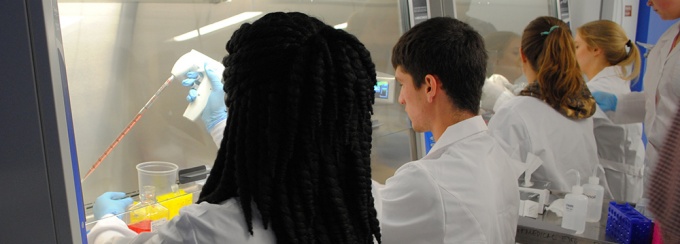Biomedical Engineering

Biomedical engineers combine the problem-solving ability of engineers with the knowledge of the biological and medical fields to develop new solutions for improving human health, healthcare, and quality of life for all people.
About the Major
This Biomedical Engineering BS program, which spans the School of Engineering and Applied Sciences and the Jacobs School of Medicine and Biomedical Sciences, provides students with the skills and knowledge needed to solve problems that directly affect the quality of life of all humans. Some of the well-established specialty areas in the field of biomedical engineering include:
- Bioinstrumentation
- Biomechanics
- Biomaterials
- Systems Physiology
- Clinical Engineering
- Rehabilitation Engineering
Research Opportunities
Working with highly accomplished faculty, students learn how to identify key questions and apply existing and new experimental tools to find solutions. Our faculty are engaged in cutting edge research and bring their expertise into the classroom to ensure that you are on the forefront of this dynamic field. Our research laboratories are designed and built for biomedical engineers, and are outfitted with state of the art equipment and technology, which enables our faculty to carry out ground-breaking work.
Employment Outlook
Based on the latest data from the Bureau of Labor Statistics, the median annual salary for biomedical engineers is $85,620, with a 10%-90% range of $51,050 to $134,620. Nationally about a third of biomedical engineering students go on to graduate school in engineering or related disciplines, about a third go on to medical school, and about a third go directly to industry.
Our graduates are employed in many areas. You can find biomedical engineers in:
- companies designing and testing new devices and systems.
- universities and hospitals as researchers and support personnel.
- government regulatory agencies, helping to develop and standards for product testing and safety.
Because of their training in both the engineering and medical disciplines, biomedical engineers are often in the role of interfacing between these two fields.
Accreditation

The Biomedical Engineering BS program is accredited by the Engineering Accreditation Commission of ABET under the commission's General Criteria and Program Criteria for Bioengineering and Biomedical and Similarly Named Engineering Programs.


